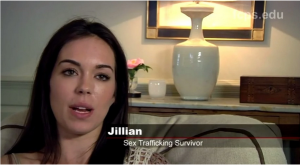Ontario Sex Ed Update!

Ontario Premier Kathleen Wynne with Tessa Hull (left) and Lia Valente at the January 26th press conference. From: Toronto Sun/Antonella Artuso
In an update on the Ontario, Canada sex ed curriculum revisions, which we brought to your attention in the January 20th Sex Ed Roundup, Premiere Kathleen Wynne held a press on January 26th to announce that the topic of consent has officially been included in the sex ed curriculum that will be introduced in September 2015. Premiere Wynne was accompanied by the two teenagers, Tessa Hill and Lia Valente, who created the “We Give Consent” Change.org petition, which has been signed by over 40,000 individuals.
Predictable backlash to the announcement ensued. Some, like Charles McVety of the Christian-based Institute for Canadian Values and Canada Christian College, claim the curriculum will “introduce sexual consent to six year olds” (quote found here). One negative op-ed in the Toronto Sun, called the curriculum content “radical” and called for the government to “send detailed leaflets home and invite parents to information nights to discuss every aspect of the curriculum.” But an article in the Winnipeg Free Press explains that the content taught beginning in first grade will be about “teaching six-year-olds respect for others’ personal boundaries and how to read social cues [such as facial expressions], laying the foundation for further education on how that relates to sexual consent later on. Consent, of course, doesn’t just happen in a sexual context.”.
When is a Sock Just Like a Condom?
If you’ve been on Facebook in the past week, you’ve probably seen the story of Sanford Johnson, Deputy Director of Mississippi First, who showed the world how to use a condom by unrolling a sock onto his foot. He explained to WREG News in Memphis that “the law that was passed in 2011 requires all school districts in the state of Mississippi to adopt a sex education policy. It either has to be an abstinence only policy or a more comprehensive abstinence plus policy,” which still bars teachers from using condoms in class demonstrations. Johnson originally posted the video to YouTube in 2012 as a joke about the state’s law, but it went viral this past week.
A Sex Educator’s Personal Opt-Out Quandry
Former HIV/AIDS prevention educator, Julianna Miner, wrote in a January 29th op-ed in The Washington Post about her process of having to make the unexpected decision of whether or not to opt her daughter out of sixth grade sex ed. As someone who always “knew one thing for certain, I would NEVER be one of those parents who indignantly pull their kids out of sex ed classes,” Miner’s decision process was prompted when she watched the video about sex trafficking of 11-13 year-old girls in her daughter’s school district that her daughter would be shown in her “Family Life Education” course.
Miner fretted over her wish to let her children stay innocent (of darker sexual issues) for “as long as they wanted” while she wondered: “how do you allow children to stay innocent when the world we live in requires their eyes to be wide open?” Ultimately, as someone who believes, “when it comes to sex (even just talking about it), you are always in charge of your own body,” Miner trusted her daughter decide whether to stay in class or not. You can see the video in Miner’s article.
Opt-In in Kansas
![By Aviper2k7 (Own work) [CC BY-SA 3.0 (http://creativecommons.org/licenses/by-sa/3.0)], via Wikimedia Commons](http://www.sexedcenter.org/wp-content/uploads/2015/02/Kansas_State_Capitol-300x225.jpg)
By Aviper2k7 (Own work) [CC BY-SA 3.0 (http://creativecommons.org/licenses/by-sa/3.0)], via Wikimedia Commons
On February 2nd, students from college campuses involved with the reproductive rights organization, Unite for Reproductive and Gender Equity, lobbied Kansas legislators to reject bills introduced by Republican Senator Mary Pilcher-Cook in 2014 that would result in an opt-in requirement for K-12 schools. As reported by The Garden City Telegram, the students believed that the bill would “build a barrier between young people and age-appropriate sex education,” especially for those students whose family relationships were not conducive to discussing sexuality concepts. Whereas, according to Pilher-Cook, the bill would “put parents back in control of what their children are being taught and the manner that it is being taught.” The Topeka Capital-Journal reported that the House Education Committee would hear the bill on February 3rd and no date was set, yet, for a hearing in the Senate. You can learn more about the bills on the SIECUS website.









